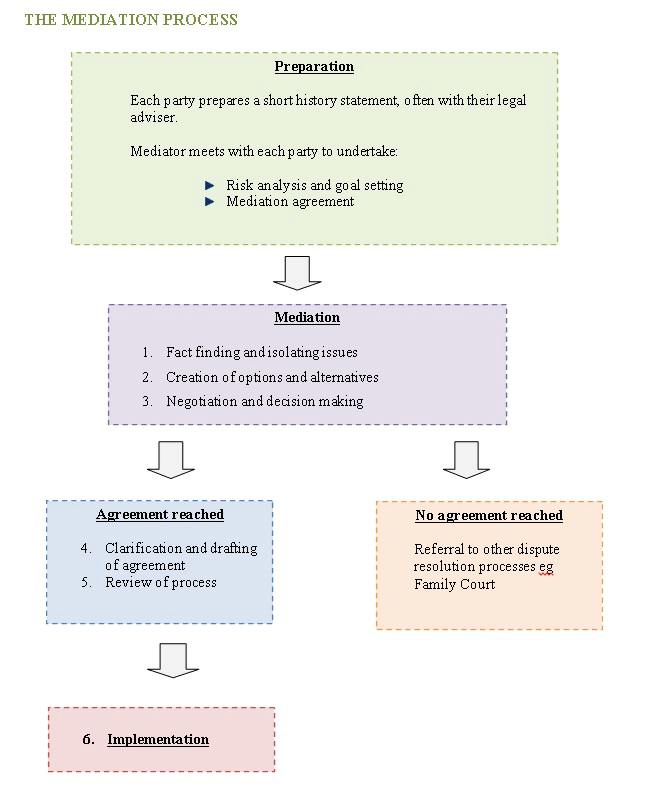Mediation
Mediation uses a neutral third party to assist a couple to reach agreement. In family law and in all relationships, partners are able to use mediation to resolve property settlements, custody matters and relationship issues.
MEDIATION
Mediation uses a neutral third party to assist a couple to reach agreement. In family law and in all relationships, partners are able to use mediation to resolve property settlements, custody matters and relationship issues.
Under the Family Law Act, since July 2007 separating couples may be required to undertake an alternative dispute resolution process — such as mediation — before a matter is allowed to go to court. This changes only in special circumstances such as domestic violence.
Mediation can take place over a number of weeks with one two-hour session per week, or mediations may be conducted over a full day, whichever is convenient to the parties.
The Advantages of Mediation
Mediation can be an amicable and effective way to achieve agreements. It is often faster and less expensive than other processes such as litigation. It also often leads to decisions that both people feel happier about. The result is that compliance with any agreement reached is more likely.
Overview of Mediation
Mediation is a voluntary process, but the Family Court may order that you and your partner participate in mediation, depending on your circumstances. Only you, your partner and the Mediator will be part of the Mediation process. Depending on the level of conflict and personal dynamics of the relationship between you and your partner two Mediators may be necessary.
Family Court of Australia
The Family Court of Australia is the final resource available to you to reach settlements on issues in dispute. The Family Court is conscious of the expense involved in resolving issues and the emotional turmoil that is normally associated with the breakdown of a relationship. The Family Court will make orders on matters requiring urgent attention.
If the Family Court orders mediation or you and your partner agree, you may be allowed to have your lawyer present in the mediation. The Mediator’s role is to assist communication between you and your partner so that you can have open discussions and negotiate a settlement.
Role of the Mediator
The Mediator’s aim is to facilitate open communication between you and your partner so that you can:
- Identify issues of the dispute;
- Generate options to address these issues; and
- Agree upon ways to resolve the issues (i.e. ‘settlement’).
The Mediator’s role is essentially a neutral one. The Mediator:
- Will not take sides;
- Will work with both you and your partner to help you negotiate your own decisions together; and
- Will not represent either of you in Court either before or after the Mediation.
Characteristics of Mediation
- All decisions in mediation will be made by you and your partner, not the Court or anyone else.
- Mediation will help you to identify important issues that relate to your assets and finances and/or care arrangements for your children.
- Mediation is readily accessible, making it fast and efficient.
- Mediation is a popular form of alternative dispute resolution.


Fact-finding and Isolation of Issues
Once the issues have been identified, the Mediator will then establish an agenda setting out the order in which the issues should be dealt with and which you believe would be the most appropriate way of dealing with such issues.
Once the issues have been identified, the Mediator will then establish an agenda setting out the order in which the issues should be dealt with and which you believe would be the most appropriate way of dealing with such issues.
Creation of Options and Alternatives
At this point, you and your partner will be looking at all the options and alternatives which could apply and which could be of assistance in resolving the issues which have been identified. By dealing with the options and alternatives, you will determine the most effective way of dealing with each issue. At this time, the Mediator will encourage you to be as creative as possible in setting up these options and alternatives.
Negotiation and Decision-Making
At this point, you will be choosing options which you can best live with and ensuring that you fully understand the details and implications of each proposal and what their consequences will be for you. This stage of the process may extend over one or two sessions. As you could imagine there will be a lot of discussion at this point in reaching agreement on those options and alternatives.
Clarification of Agreements Reached
Hopefully, agreements will be reached on issues which have been isolated and discussed, and the Mediator will then prepare a written draft setting out your concerns, intentions, the facts agreed and decisions which have been reached. The agreement can also deal with your future dealings and relationships.
Review of Process
At this point you can look at the matters that need to be made legally binding and determine the future review procedures required, if any.
Implementation Stage
This really speaks for itself in that the agreement is then put into practice




